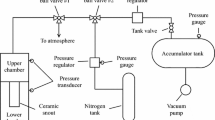Abstract
Riser sleeves are a popular feeding aid used in the metal casting industry. Reliable simulation of the performance of riser sleeves requires accurate temperature-dependent thermophysical properties. Unfortunately, there are little or no property data available in the open literature. A procedure for developing thermophysical properties of riser sleeves for steel castings is presented here along with its results. Analyses are performed using these sleeve properties to investigate optimal sleeve use. The modulus extension factor (MEF), which quantifies sleeve performance, is calculated for sleeve materials. Regardless of casting size studied here, the MEF determines casting yield improvement when using riser sleeves, and exothermic reactions do not necessarily increase yield unless they increase the MEF. Analyzing the effect of sleeve thickness on casting yield, it is found that the thicknesses of most commercially available riser sleeves are too small to maximize casting yield, particularly for risers of 8 in. diameter and larger.



















Similar content being viewed by others
References
M. Blair, Riser sleeves-insulating or exothermic, in Proceedings of the 64th SFSA Technical and Operating Conference. Paper No. 3.3, Steel Founders’ Society of America (SFSA), Chicago, IL (2010)
L. Sully, J.E. Wren, C.E. Bates, Evaluation of Exothermic and Insulating Materials—A Literature Review. SFSA Special Report No. 13 (1977), pp. 1–53
C.E. Bates, W.D. Scott, L. Sully, J.E. Wren, Evaluation of Riser Feeding Aids. SFSA Research Report No. 83 (1977), pp. 1–21
Foseco, Measuring the thermal efficiency of feeding aids. Foundry Pract. 205, 6–10 (1982)
J.R. Brown, Feeding of castings. Chapter 19 in Foseco Ferrous Foundryman’s Handbook, 11th edn. (Butterworth-Heinemann, Oxford, 2000), pp. 296–343
A.C. Midea, M. Burns, M. Schneider, I. Wagner, Advanced thermo-physical data for casting process simulation—the importance of accurate riser sleeve properties. Int. Foundry Res. 59, 34–43 (2007)
MAGMA5 Release Notes (version 5.2), MAGMA GmbH, Aachen, Germany (2014)
Z. Ignaszak, P. Popielarski, J. Ciura, Heat source description of iso-exothermic sleeves with the use of continuous function. Arch. Foundry 5(15), 157–163 (2005)
Z. Ignaszak, P. Popielarski, Contribution to thermal properties of multi-component porous ceramic materials used in high-temperature processes in the foundry industry, in Heat and Mass Transfer in Porous Media. Advanced Structured Materials, vol. 13, ed. by J. Delgado (Springer, Berlin, 2012), pp. 187–218
R.A. Hardin, T.J. Williams, C. Beckermann, Riser sleeve properties for steel castings and the effect of sleeve type on casting yield, in Proceedings of the 67th SFSA Technical and Operating Conference. Paper No. 5.2, Steel Founders’ Society of America (SFSA), Chicago, IL (2013)
K.D. Carlson, C. Beckermann, Determination of solid fraction-temperature relation and latent heat using full scale casting experiments: application to corrosion resistant steels and nickel based alloys. Int. J. Cast Metals Res. 25, 75–92 (2012)
P. Kelter, M. Mosher, A. Scott, Chemistry: The Practical Science (Houghton Mifflin, Boston, 2009), pp. 196–197
P.F. Wieser, Riser design for steel castings, in Gating and Risering: State of the Art, ed. by J. Svoboda, G. Meiners (Steel Founders’ Society of America (SFSA), Chicago, 1982), pp. 80–102
Acknowledgments
The authors gratefully acknowledge funding from the Iowa Energy Center to conduct this research through Grant No. 12-01. The authors would like to thank Jerry Thiel, Sairam Ravi and the staff and students at the University of Northern Iowa Metal Casting Center for their help in performing the casting experiments. In addition, the authors acknowledge the guidance and support of the Steel Founders’ Society of America and member foundries, and their donation of riser sleeves used in this study.
Author information
Authors and Affiliations
Corresponding author
Rights and permissions
About this article
Cite this article
Williams, T.J., Hardin, R.A. & Beckermann, C. Thermophysical Properties and Performance of Riser Sleeves for Steel Castings. Inter Metalcast 10, 535–555 (2016). https://doi.org/10.1007/s40962-016-0041-7
Published:
Issue Date:
DOI: https://doi.org/10.1007/s40962-016-0041-7




